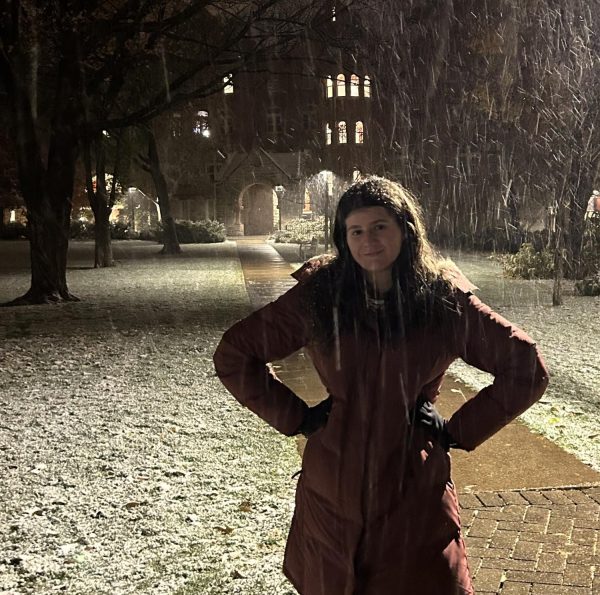On Thursday, Feb. 29, Macalester College Student Government (MCSG) met in the Harmon Room for their weekly meeting to hear from Macalester Undergraduate Workers’ Union (MUWU) and to vote on Resolution 15, which calls for Macalester to voluntarily recognize the union, which the administration has stated it will not do. Vice Provost and Associate Dean of the Faculty Paul Overvoorde also presented on the strategic plan as one of its co-chairs.
The meeting began with a unanimous vote to charter Tabletop Role-Playing Games Club after a presentation from a representative for the org.
MUWU leaders Henna Schecter ’26 and Roxy, who asked to be identified by their first name only, joined the meeting to answer questions from the Legislative Body (LB) about the union. Responding to concerns that the union would reduce Cafe Mac student worker hours, which could put undue strain on the Bon Appetit workers, the MUWU representatives said that the real issue is work study students running out of hours they can work, leading to understaffing.
“Most Bon App workers we have talked to are in support of decreasing student hours and increasing student salaries,” Schecter said.
MUWU then responded to a question from senior class representative Sophia Norha ’24 on one of the biggest concerns about the union: where money for increased wages would come from. Schecter relayed that in contract negotiations, which would happen after forming the union, MUWU would insist any wage increases not lead to an increase in tuition or affect financial aid.
Financial Affairs Committee (FAC) Chair Eliora Hansonbrook ‘25 pointed out that, more realistically, one cannot confirm the money would not come out of tuition.
“Realistically, any increase in tuition would disproportionately affect people who could pay it,” Hansonbrook said, explaining that budgeting in higher education doesn’t usually work out so specific projects can be routed without certain funds.
MUWU also specified that they’re looking for wage increases for all student workers, not just Cafe Mac student workers, and that union dues would never surpass wage increases.
Schecter explained that the biggest reason MUWU wants voluntary recognition from Macalester is time.
“The goal is to get students’ concerns into a contract to be negotiated as soon as possible. With voluntary recognition, we don’t have to wait six to eight weeks and possibly start all over again,” Schecter said.
Voluntary recognition would mean that Macalester accepts the union without a secondary secret ballot election, and each union card signed would count as one vote. Though the administration denied this request, MUWU says there’s still time to be voluntarily recognized.
The LB proceeded to vote on Resolution 15, which calls for Macalester to voluntarily recognize MUWU if the majority of student workers sign union cards. The motion passed, with 21 votes in favor, one abstaining and five in opposition.
After the vote on the resolution, Overvoorde presented Macalester’s 2022-2030 strategic plan, “Imagine, Macalester.” The plan was adopted by the Board of Trustees in 2022, and the planning process involved student champions, staff, faculty, alumni and community members.. He first briefly explained what a strategic plan is and its significance.
“Strategic plans … are something that institutions of higher ed end up creating approximately every eight to 10 years,” Overvoorde said. “They oftentimes are setting out a direction, prioritizing particular kinds of activities or calling forth particular strengths that the place has to build on.”
Overvoorde explained that when “Imagine, Macalester” was adopted, there were priorities set up for each area of growth: four concerning Macalester’s curriculum, three priorities concerning culture and two priorities concerning the campus’ infrastructure. Each of these priorities contains a subset of goals that Macalester hopes to achieve in the next eight years.
Overvoorde gave specific examples of some of the progress made in the areas that “Imagine, Macalester” targets, including infrastructure changes reflected in the Comprehensive Campus Plan. Currently, the Lampert Building is being renovated, and once those renovations are completed this spring, renovations of the Campus Center will follow this summer.
Additional scheduled changes on campus, which will take place in 2025 after the 2024-25 academic year, will involve the Cottages, the Cultural House and the construction of a new residence hall.
Overvoorde also discussed policy updates, including how international students are now allowed to use their financial aid award for study away. He mentioned updates to winter break housing, in connection with the work that MCSG had been doing around this issue, and ease of navigation improvements to the incoming student portal, as well as the structure of New Student Move-in and Orientation.
The meeting ended with committee updates, including a reminder from Communications & Engagement Committee Chair LeSean Greer ’25 about the upcoming MCSG elections and a related information session that will take place on March 18.











